Period Fatigue — 7 Wise Woman Secrets

by Corinna Wood
You’re tired. I totally get it, sister.
Know that period fatigue is a common symptom that many women experience before or during menstruation (not to mention menopause as well!). Fatigue with your period is actually a normal reaction to the hormonal changes that occur in your body.
So let’s hold on a sec here.
I invite you to recognize your "fatigue" as your body’s remembrance of a simpler time—a time when women followed their natural cycles by resting and retreating during their moontimes.
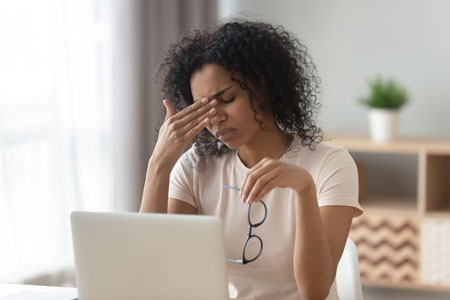
Table of Contents
7 Wise Woman Ways to Address Period Fatigue
- Take a moon day
- Drink herbal infusions
- Embrace natural rhythms
- Allow yourself to rest and nap
- Eat nourishing traditional foods
- Remember you’re the expert in your body
- Honor your emotions
Fatigue with your period? You’re not alone!
You’re searching for natural ways to alleviate some of the discomfort that comes with exhaustion during menstruation. You and thousands of other women who are having their periods this month!
Of course you are.
Due to menstruation, your emotions and perceptions are heightened. There's a primal urge to slow down and remove yourself from your daily routines.
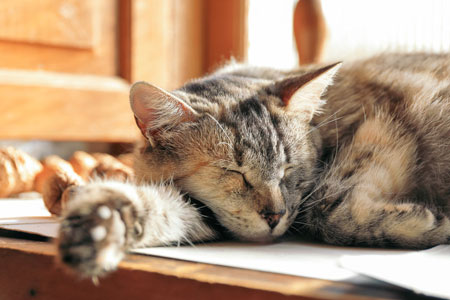 In modern times, menstrual cycles are largely ignored. Social conventions place a taboo on discussing your menstrual cycle. You’re supposed to constantly be productive, keeping a happy face as you work hard and nurture those around you.
In modern times, menstrual cycles are largely ignored. Social conventions place a taboo on discussing your menstrual cycle. You’re supposed to constantly be productive, keeping a happy face as you work hard and nurture those around you.
Nature offers a different perspective. When you watch your cat, what do you see?
Mammals spend most of their time resting and playing!
The truth is that fatigue from your period stems from a natural pull to draw inward and be restful.
So addressing period fatigue takes a bit of rethinking of the modern mindset—the “secrets” are hidden in plain sight.Let's dive in and take a look at each of these wise woman ways I recommend for addressing fatigue with your period . . .
1. Take a moon day
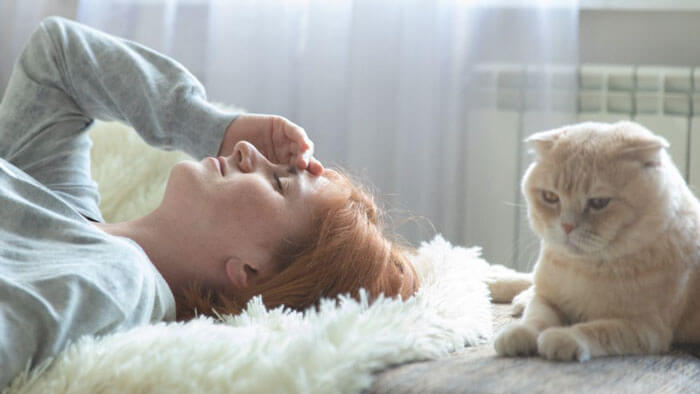 In various traditional societies where the natural order of things was revered, the “moon lodge” offered a retreat . . . a cradle to receive women when they were longing for rest and felt most vulnerable.
In various traditional societies where the natural order of things was revered, the “moon lodge” offered a retreat . . . a cradle to receive women when they were longing for rest and felt most vulnerable.
My understanding is that if you dig far enough back into the roots of these traditions, this practice wast not an exile imposed upon the unclean or the unwanted.
Rather, this was an opportunity for women to care for themselves and one other.
Does this resonate for you? Today, women worldwide are rediscovering and embracing the moon lodge or red tent—or simply creating a sweet space of your own to retreat during that time of the month.
What does that look like?
A time and place for rest and respite—the very things your body is asking for when you experience fatigue from your period.
Sacred space to connect with the spiritual, immerse in reflection, and be still.
These days, you may not always have the option of leaving your responsibilities behind for a week. Yet you can honor your need by taking a moon day—or even just a moon hour. Either just before your bleeding begins or at its height (usually around the second day).
A moon day is a time to nourish yourself. What is your body craving? Take a bath, sleep, or walk in the woods. This is a time for you to take care of yourself.
By proactively taking that time to nourish, rest and restore ourselves, many women find that, over time, fatigue from periods is greatly diminished.
Acknowledging your body’s urgent request to slow down is an opportunity to care for ourselves as a preventative or a restorative measure.
2. Drink herbal infusions
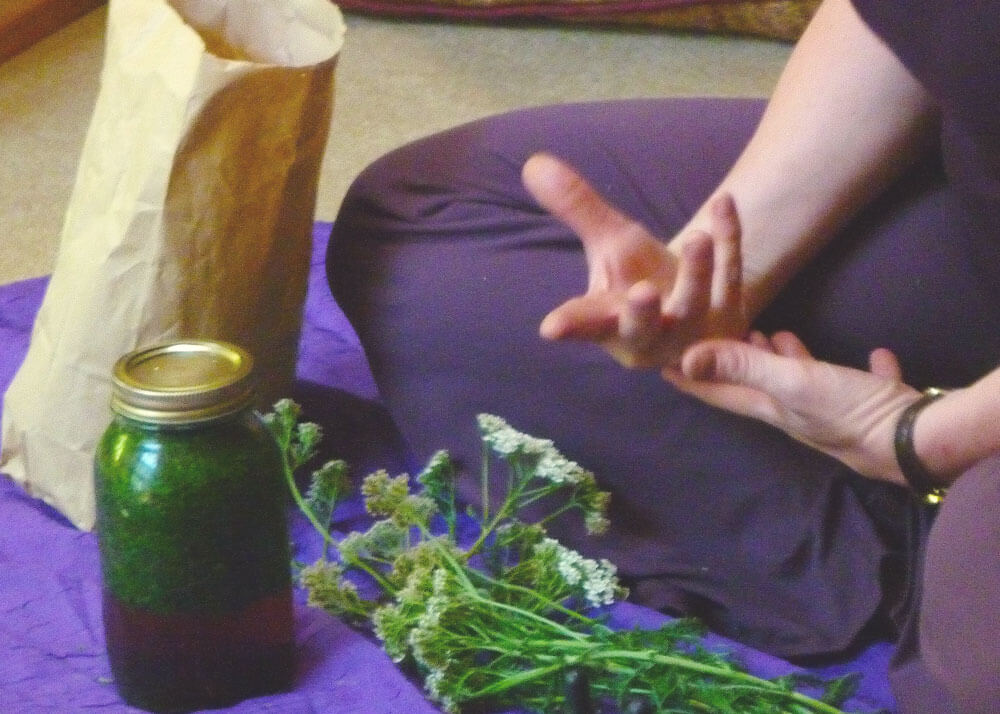 Through a wise woman herbal perspective, I recommend drinking nourishing herbal infusions on a regular basis throughout the month to support your hormonal system.
Through a wise woman herbal perspective, I recommend drinking nourishing herbal infusions on a regular basis throughout the month to support your hormonal system.
An infusion is a potent, powerful medicinal tea.
To make an infusion, the plant material must be steeped for a long time. I find the easiest way to do this is to prepare it before going to bed and drink it in the morning.
For detailed preparation instructions, see my blog article on making herbal infusions.
Two herbs that I especially love for reducing fatigue with your period are nettles and red raspberry leaf.
Nettles are high in chlorophyll and iron, so this plant is very powerful for building your blood. She steadily nourishes the bones, the blood and the adrenals.
Adrenal fatigue is a common symptom among women these days and can be related to experiencing fatigue with periods.
For menstruating women, Nettles is a superstar!
Nettles also addresses premenstrual bloating and breast tenderness by stimulating the kidneys to rid the body of excess water.
Red raspberry leaf is rich in minerals and vitamins that can ease menstrual cramps and other symptoms of PMS. Add red raspberry leaf to your daily infusion or drink it in the week or two preceding your menstruation.
Want more ways to incorporate herbs into your daily life? You're welcome to grab a free copy of my guide: Wild Plants, Wild Women! (pdf)
3. Embrace your natural rhythms
Just as a plant moves from seed to bloom and back again, so does homeostasis in a woman's body.
The sun cycles from light to dark in one day, the moon waxes from full to dark in a month and the seasons spiral from cold to warm in a year.
Your period or bleeding signifies the beginning of the menstrual cycle. This is called the follicular phase which continues until ovulation—when one of the follicles (containing an egg) is released.
Typically, the follicular phase creates a rise in energy levels as the hormone estrogen is increasing in the body. This can be a time to channel your energy toward projects or increased physical activity.
When you ovulate—usually around the middle of your cycle—a mature egg is released from the ovaries. Women speak to increased energy and heightened desires for social connection.
That's the full moon time for your ovaries!
Next, the luteal phase begins as levels of the hormone progesterone rise and then drop dramatically just before your period. This is when PMS symptoms tend to show up, including fatigue from your period.
As your body naturally shifts between different hormonal states, your needs for rest, alone time, movement, contribution and nourishment change too.
Notice how you feel in each stage of your hormonal cycle. Journaling—or just making little notes in your calendar—can be a useful tool to help you notice trends.
As you start to recognize the shifts that happen within yourself in each stage, you can better prepare for those ebbs and flows. Give yourself more space (ideally with fewer things to accomplish!) during the luteal phase and menstruation.
After your period finishes, you may even be able to cross a few extra things off your checklist during your follicular phase!

Embrace the natural rhythms in your body by resting when your body calls for rest— and engaging excess energy when you’re raring to go.
Period fatigue is your body reminding you that it’s working hard and needs your care and consideration.
As you allow yourself to slow down in response to your internal cue for rest, you signal to yourself that rest is a valid need. Over time, this practice can reduce fatigue with your period.
4. Allow yourself to rest and nap
Rather than ignoring or covering your low energy states with stimulants such as caffeine, allow yourself to rest.
Focusing on giving your body the rest that you need allows long-term health and healing to organically emerge.
The truth is, over time, using caffeine and other stimulants actually decreases your baseline energy levels—and contributes to adrenal exhaustion, which is endemic among women today.
So you may want to consider replacing your morning coffee with a cup of nettles infusion instead! Or try raspberry leaf infusion—the taste is reminiscent of black tea.

Yet most women receive far less than needed, due to the multiple demands on our time and energy.
Naps are now known to have a huge array of benefits, from improving memory and elevating mood, to reducing stress and lowering blood pressure.
As you practice turning inward, identify signals from your body and honor those messages. Notice how often you feel physically tired.
When you feel tired, and have the time to rest, give yourself permission! Resist the cultural conditioning that’s telling you rest is laziness and give yourself the gift of rest when you experience fatigue with your period.
Wondering where to start? Grab my free guide on 5 Steps to Create a Space for Self-Healing (pdf) to support your journey of healing and wholeness.
5. Eat nourishing traditional foods
Addressing fatigue with periods includes nourishment for the body—good water, local organic produce, fermented foods like yogurt and sauerkraut, and healthy fats like organic butter and coconut oil.

This includes nourishing your body with healthy, whole food.
This is different from other traditions that see the body as dirty, needing to be “cleansed” or purged of impurities through dieting and fasting—which reinforces an adversarial relationship with your body.
Healthy nourishment includes a wide range of fresh, wholesome foods—both cooked and raw, usually from a variety of plant and animal sources.
And that includes healthy fats.
You may be thinking, “What? Fats? I’m scared!”
As women, we are culturally conditioned to be afraid of eating fat. I know, fats have been demonized in both mainstream and alternative nutrition.
Yet the truth is that we need to have healthy fats in our diet to encourage the smooth functioning of the hormonal system.
Despite the recent low-fat fervor, healthy fats are an essential component of nutrition for women and growing children.
As Mary Enig and Sally Fallon show us in their book Eat Fat, Lose Fat! incorporating healthy fats into your daily nourishment actually supports your body in regulating to your ideal weight.
So often these days, our bodies are starved of the nutrients we really need, contributing to food cravings, blood sugar swings, and overeating of carbohydrates.
Healthy fats support the adrenal system, the menstrual cycle, give concentrated energy, reduce sweet cravings, assist in the digestion and absorption of minerals and other nutrients in food; thereby supporting the hormonal, nervous, and immune systems.
Healthy fats are an essential nutrient for the human body. Read that again, sister.
So savor the flavor and indulge in more richness by adding more of these healthy fats to your meals:
- Avocados
- Organic butter or ghee
- Coconut oil or olive oil
Are you ready for my favorite way to incorporate healthy fats into your diet? It’s delicious and nutritious —no sweetener, super simple, quick and easy. Take a peek at my recipe for coconut oil “fudge.”
Allow yourself to eat when you’re hungry and acknowledge that your body’s needs for nutrition change greatly around your period. You may feel more hungry when you’re bleeding; that’s perfectly normal.
Honor what your body needs and nourish yourself with a wide variety of nutrient-dense whole foods, including healthy fats.
The more well-nourished you are, the less exhaustion and fatigue will accompany your period.
6. Remember you're the expert on your own body
You may have come to a place where fatigue with your period has you seeking medical intervention.
In doing so, remember, you are the expert in your own body.
 If you’re feeling an urge to seek help from outside of yourself, honor that.
If you’re feeling an urge to seek help from outside of yourself, honor that.
As you walk along this path trust that you know what’s best for you and hold onto that trust as you begin a dialogue with others.
Remember, it's up to you to decide which advice is in accord with your own experience of your body.
If your doctor’s recommendations resonate for you, you can consciously choose to act on them.
If not, give yourself the power of choice—and certainly don’t allow the healthcare system to limit your options.
Through remaining in your own power, you can develop a partnership with your health care providers—one in which they are resources and allies.
For more suggestions along these lines, see my blog article on embodying your power by reconnecting with your sacred body.
7. Honor your emotions
Another factor to consider when addressing your period fatigue is mood swings.
As a woman, you are naturally blessed to have a hormonal system that supports the release of pent-up emotions on a monthly basis through your menstruating years (and again during menopause!).
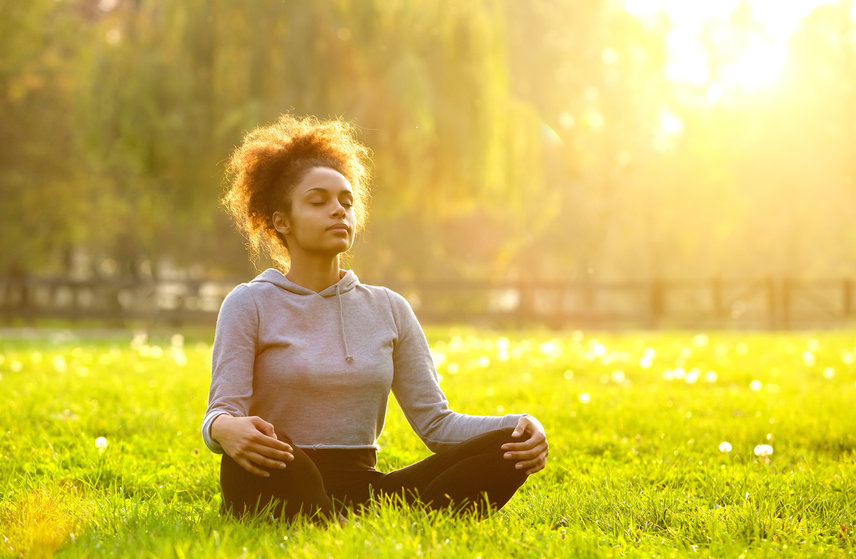 When you notice difficult emotions rising up, how do you respond?
When you notice difficult emotions rising up, how do you respond?
Do you regularly stuff them down or ignore them?
If this sounds familiar, consider adjusting your reaction to anger, grief, sadness or frustration.
These are normal feelings. The concept of bad or good emotions is a fallacy. All feelings are clues to your underlying needs.
So the next time rough feelings come up, consider journaling about what needs were being unmet at that moment.
Period fatigue also invites you to consider that your tiredness may not be entirely physical. That's the nature of body-mind-spirit interconnectedness of holistic healing.
By acknowledging the full range of your emotions, you can shift the story you may be carrying about the cursed return of "Aunt Flow."
Your period may even become a welcome time to reconnect with your inner wisdom and intuition.
Addressing fatigue with your period the wise woman way
 The key to addressing fatigue with your period is to embrace your lunar dance with bleeding.
The key to addressing fatigue with your period is to embrace your lunar dance with bleeding.
Treat yourself and your menstrual cycle with the same respect and nurturing that you extend to all those you care for.
Nourish your body with herbal infusions and other essential nutrients.
Don’t just take rest . . .
Allow rest, honor rest, relish in it!
Rewrite your internal dialogue about allowing yourself to slow down and turn inward.
Thus you allow your body and soul to truly absorb the benefits of this practice.
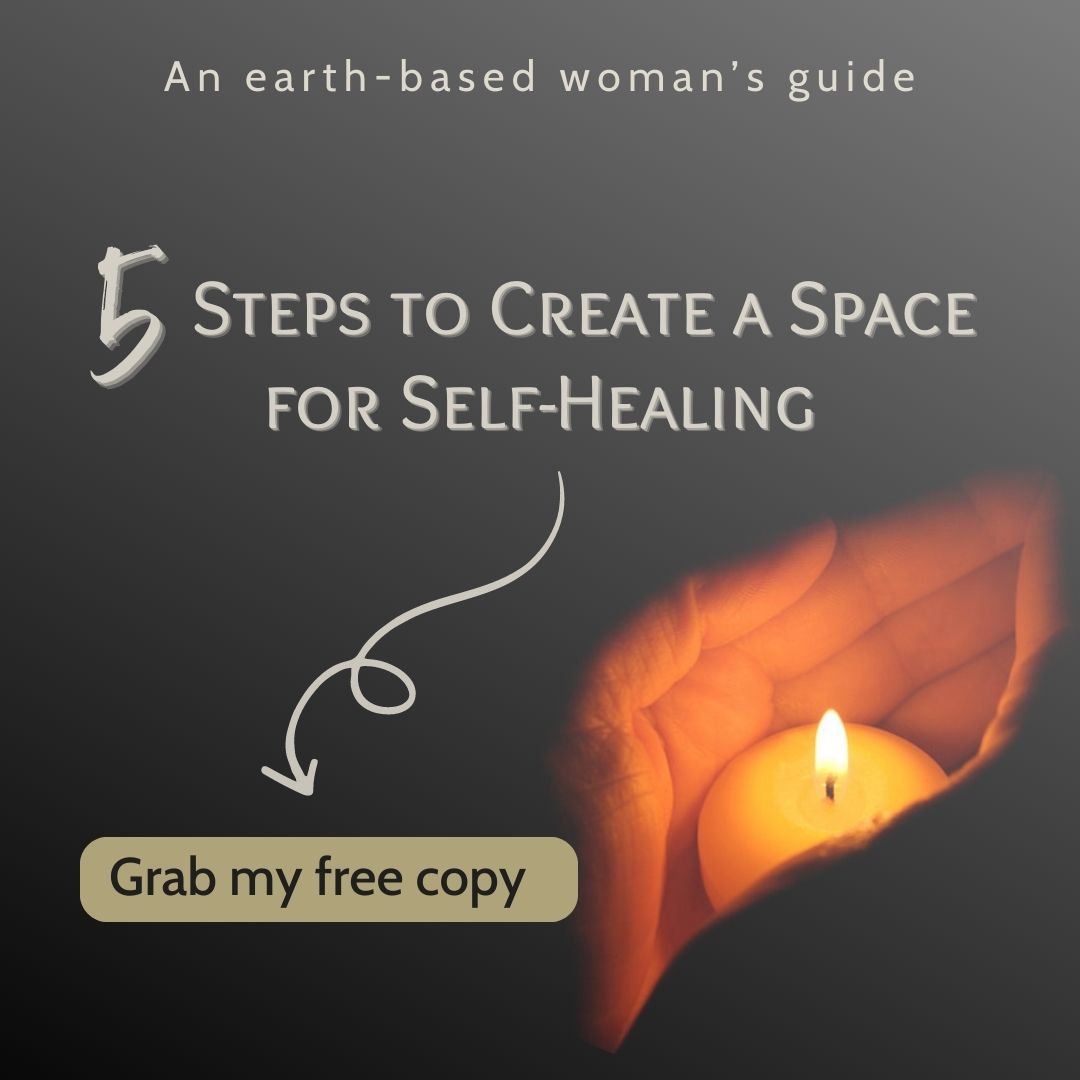 Embrace your natural rhythms and whenever possible, take a “moon day.”
Embrace your natural rhythms and whenever possible, take a “moon day.”
When you make space for yourself in a candlelit bath or in a dark bedroom, you're giving your body what she is calling for without your body needing to create so much distress in order to receive it!
It may seem impossible at first to create space in your life like this, so start with small steps.
Blessings on your journey of healing and wholeness, sweet sister!
______________
Spread the wise woman ways! Link to this article from your website, or share with your friends using this button
Comments ~ what stands out for you today?







